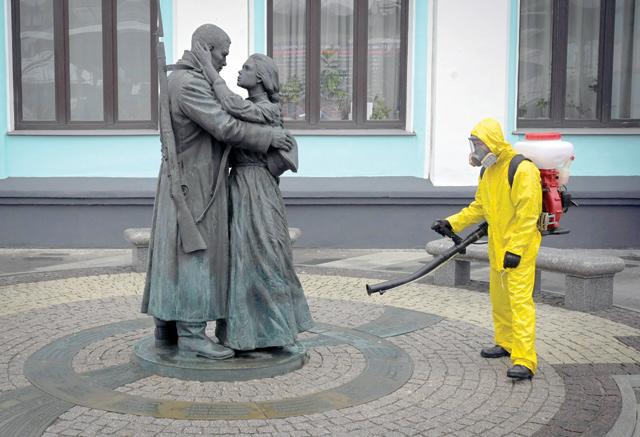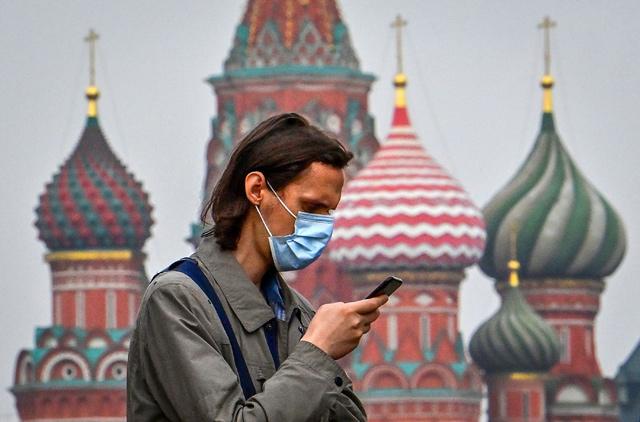You are here
Moscow to shut non-essential services over virus
By AFP - Oct 22,2021 - Last updated at Oct 22,2021
MOSCOW — Moscow will shut non-essential services between October 28 and November 7, its mayor said on Thursday, as coronavirus deaths soar and vaccination rates stall in Russia, the country in Europe hardest hit by the pandemic.
Mayor Sergei Sobyanin announced the 11-day closure a day after President Vladimir Putin ordered a nationwide paid week off at the end of the month to curb fast spreading infections.
Russia reported 1,036 Covid-19 deaths in a single day Thursday, but officials have warned the worst is yet to come, with only 35 percent of Russians fully vaccinated.
Putin will have no in-person meetings during the non-working period, the Kremlin said.
"There will be no face-to-face events taking into account the difficult epidemiological situation," his spokesman Dmitry Peskov told state news agency RIA Novosti.
Authorities have previously gone to great lengths to protect the 69-year-old -- who the Kremlin says is fully vaccinated -- since the start of the pandemic. Sobyanin said all non-essential retail, sporting and entertainment venues must temporarily close. Shops selling food, medicine and other essentials will remain open.
Restaurants and cafes will be able to sell take-away food, the mayor said in a statement.
Mass events will be banned and schools will be closed, with the days off coinciding with national school holidays.
Theatres and museums can stay open, but entry will be allowed only with QR codes.
The mayor said the measures were necessary because the "situation in Moscow is continuing to develop according to the worst-case scenario." 'Protecting lives'
When restrictions end on November 8, Moscow will also halt free public transport passes for unvaccinated passengers over 60 or with chronic disease. "Please take this decision with understanding. It was adopted with the aim of protecting the lives and health of the most vulnerable Muscovites," Sobyanin said.
He had previously told unvaccinated over-60s in the Russian capital to work from home and extended mandatory vaccinations for service workers. Officials this week said the virus is spreading faster than ever, with Russia registering 36,339 new cases on Thursday.
Deputy mayor Anastasia Rakova said hospitalisations had risen three-fold within a month, linking it to the infectious Delta variant.
She said taking people off work was "one of the most effective epidemiological measures for large cities".
Putin on Wednesday linked Russia's high death rates to what he called an "unfortunately" low vaccination rate.
"Please, show responsibility," he urged Russians. He also said he was surprised by how many Russians were refusing the vaccine, even among his "close friends".
Despite multiple pleas from Putin and the homegrown Sputnik V vaccine being widely available since December, many Russians are reluctant get themselves vaccinate.
Putin's own spokesman Dmitry Peksov said Wednesday that he had not been inoculated, pointing to "a high level of antibodies."
Although it is being used in dozens of countries, Sputnik V is not approved by the EU or by the World Health Organisation.
An aide to Russia's health minister, Alexei Kuznetsov, said on Thursday that the date for an inspection by the EU's drug regulator, the European Medicines Agency, was "still being discussed".
"We are preparing a visit [by the EMA] this year," he was quoted as saying by state news agency TASS.
Asked if it was true that there was no possibility that Sputnik could be cleared this year, Fergus Sweeney, head of clinical studies and manufacturing task force at the European Medicines Agency, said he could not comment on the timeline.
"Regarding the evaluation of the Sputnik vaccine, that remains under rolling review, we're continuing the assessment and interactions with the company," he told reporters.
The fatalities on Thursday brought the country's official death toll from the disease to 227,389.
But figures published by statistics agency Rosstat in October paint a far darker picture, suggesting that more than 400,000 people have died in the country from the coronavirus.
Related Articles
MOSCOW — Moscow mayor Sergei Sobyanin on Saturday announced a "non-working" week in the Russian capital, with non-essential workers told to
MOSCOW — Moscow's mayor on Tuesday ordered the city's first coronavirus restrictions since the summer, as Russia registered 1,015 daily COVI
MOSCOW — President Vladimir Putin announced on Wednesday that Russia has registered its second coronavirus vaccine, while the country report



















